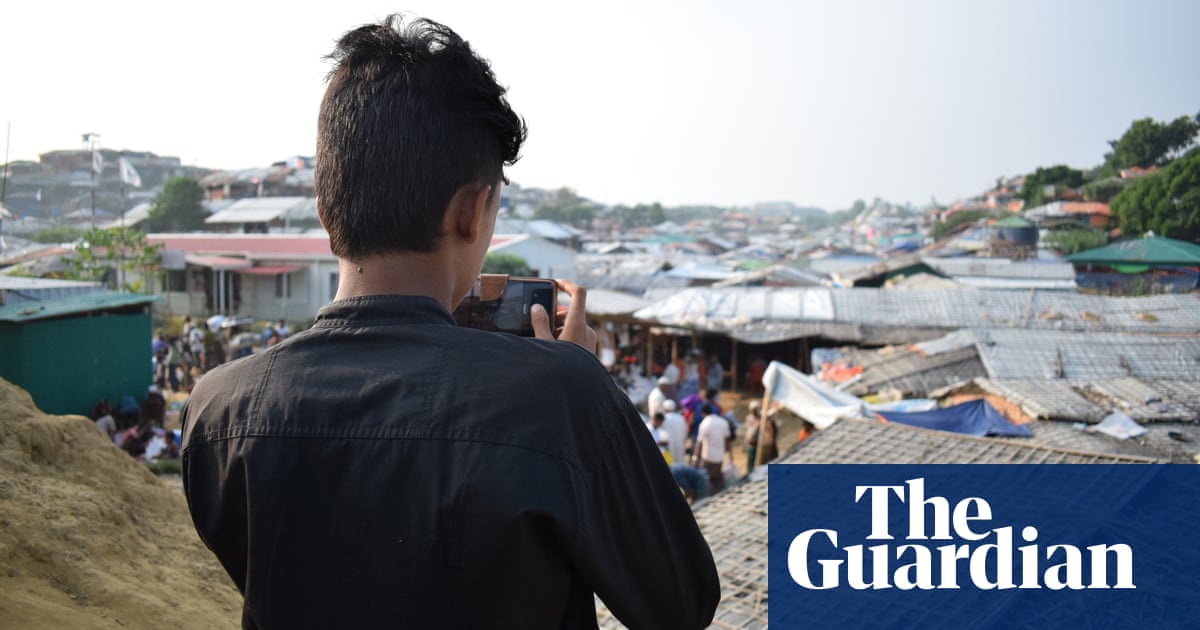The Bangladeshi government is making life hard for young people trying to document levels of hardship in the worlds largest refugee settlement

For Azimul Hassan, 19, life before he entered the world’s largest refugee settlement was always busy.
He would wake early to visit his private tutor before school, then work late every evening to finish his homework. On Fridays, he would play football with friends – he was a striker.
Now his days are very different. Education is limited in the camps, and he no longer plays sport as there is little space. But he has developed a passion for photography and for social media, which has given him a sense of purpose.
“I know Instagram has good reach, all over the world. The Rohingya are suffering and I want to tell everyone about that. I take photos and upload them. Maybe I take 10 photos a day and I share about two online,” he says.
But offering a glimpse inside the Cox’s Bazar camps – home to more than one million Rohingya who have fled persecution and violence in Myanmar– has become harder since the Bangladeshi government launched a crackdown that they say is for security reasons. The measures used include temporarily blocking internet services and confiscating mobile phones.
Hassan says the poor internet connection makes it difficult to post photos on Instagram. “It’s also hard for other reasons,” he adds. “My grandfather is in another part of the camp and I cannot call him if I urgently need to. That makes me upset.”
Hassan’s photography was encouraged by the TV discussion forum Doha Debates and human rights organisation Fortify Rights.
“My favourite photograph is this one,” he says, showing a picture of a man with his arm outstretched, baring a scar.
View this post on InstagramA Rohingya survivor showing the scar on arm inside the makeshift shelter
A post shared by Azimul Hassan (@azimulhass) on Feb 21, 2019 at 6:18pm PST
“I went to a shop to drink tea and met this man. He could not speak, but I saw the scar and said: ‘How did you get it?’ Someone else was accompanying him and told me that he was caught by the military in Myanmar. He was beaten badly and they tied him so hard that it left a scar. That’s when I took the photo.”
Hassan is not the only young photographer operating in the camp. Omal, 18, takes pictures for similar reasons. “I know how to take photographs thanks to some basic training I received [from Doha Debates and Fortify Rights], and now I do it every day,” she says.
“I want to be educated and do more for my community. But now I am scared and worried because I have seen many people getting their phones confiscated and my phone is my only camera. I am worried about using the camera when I am out as I do not want to lose it.”
View this post on InstagramA post shared by Omal Khair (@omalkha) on Aug 25, 2019 at 11:58pm PDT
There are also other people sharing videos and other information with Rohingya Vision, a YouTube channel based in Malaysia, and the Arakan Times.
Jamal, 22, was born in the camps. His family came to Bangladesh in the 1990s, as part of the first influx of Rohingya refugees. He says things have been very different since the new arrivals appeared two years ago.
“Before then, life was quite relaxed. We could move around the country and there was no mobile phone restriction. I heard from elders that we were going to get more permanent cards to stay in Bangladesh. There were talks of integration, but those talks have stopped now,” he says.
“We have a WhatsApp group where we share reports. I work for the Arakan Times and I share what I see here,” he says, adding that they focus on the repatriation of the community and their rights.
“Most of the Rohingya want to go back, but before that they want to know their demands [for citizenship] will be met.”
He says because of the internet ban, which has now at least been lifted, he had to work as a labourer. He used to “record videos and interviews and send it over [to the news agencies]. I did not write the articles, they were written by other people, but I shared what was happening here,” he says.
Documenting life in Cox’s Bazar goes beyond being able to get stories out, it also gives people in the camps a sense of purpose.
“It’s a good feeling, a good thing to do. It means my work can help the community and I can put out stories to the world. [It] gives me a sense of focus and empowerment. Life is much harder without it,” Jamal says.
Read more: www.theguardian.com








![[Video] How to get rid of bed bugs in Toronto](https://www.thehowtozone.com/wp-content/uploads/2019/10/maxresdefault-2-100x70.jpg)


